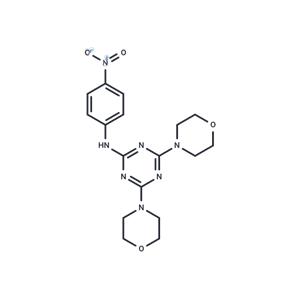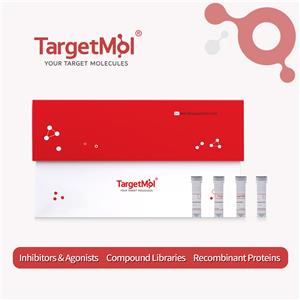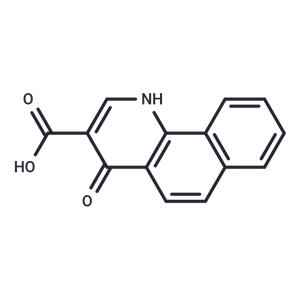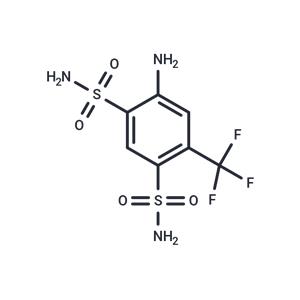
MHY1485 NEW
| Price | $43 | $61 | $113 |
| Package | 5mg | 10mg | 25mg |
| Min. Order: | |
| Supply Ability: | 10g |
| Update Time: | 2024-11-19 |
Product Details
| Product Name: MHY1485 | CAS No.: 326914-06-1 |
| Purity: 98% | Supply Ability: 10g |
| Release date: 2024/11/19 |
Product Introduction
Bioactivity
| Name | MHY1485 |
| Description | MHY1485 is an mTOR activator that is cell-permeable. MHY1485 inhibits autophagosome and lysosome fusion, leading to accumulation of LC3II proteins and increased autophagosomes, thereby inhibiting cellular autophagy. |
| Cell Research | MHY1485 is dissolved in DMSO and then diluted with appropriate media[3]. MC3T3-E1 cells are maintained in Dulbecco's modified Eagle's medium (DMEM) supplemented with 10% fetal bovine serum (FBS), 100 U/mL penicillin and 100 mg/mL streptomycin at 37°C in a humidified atmosphere of 5% CO2. Having reached 70% confluence, the culture medium is switched to commercial osteogenic differentiation medium. MC3T3-E1 cells are cultured in the osteogenic differentiation medium for 14 days, following by culture in DMEM supplemented with varying concentrations of liraglutide (catalog no. HY-P0014; MedChem Express) for a further 14 days. MC3T3-E1 cells treated with 4 nM liraglutide are cultured in the presence or absence of Compound C or MHY1485. MC3T3-E1 cells maintained in DMEM for 28 days in the absence of any treatment are used as the negative control (NC); cells cultured in commercial osteogenic differentiation medium for 14 days and in DMEM without liraglutide for an additional 14 days are used as the positive control (PC)[3]. |
| Kinase Assay | Ovaries from mice at day10 of age are treated with 10 μM MHY1485 for 3h and proteins are extracted using M-PER Mammalian Protein Extraction Reagent containing a protease inhibitor cocktail. Protein concentrations in supernatants are determined by the bicinchoninic acid method. Equal amounts of protein lysates are loaded on 4-12% NuPAGE Bis-Tris gels in MOPS buffer and transferred to 0.45 μM pore nitrocellulose membranes[2]. |
| In vitro | METHODS: MDA-MB-231, BT-20, MDA-MB-468 cells and T cells were co-cultured and treated with Atezolizumab (50-100 μg/mL) for 4-24 h. T cell-mediated cytotoxicity assay was performed. RESULTS: Atezolizumab significantly enhanced T cell-mediated cytotoxicity of MDA-MB-231 cells in a dose-dependent manner, with 100 μg/mL concentration of Atezolizumab showing significant efficacy at 4 and 24 h incubation. Similar results were obtained with BT-20. No Atezolizumab-induced T cell-mediated cytotoxicity was observed in PD-L1- MDA-MB-468 cells compared to MDA-MB-231 and BT-20 cells. [1] METHODS: MDA-MB-231 cells were treated with Atezolizumab (0.5 μg/mL) for 24 h. Surface expression of PD-L1 was detected by flow cytometry. RESULTS: Almost all MDA-MB-231 cells were positive for PD-L1, but detection of PD-L1 epitopes was blocked by the specific antibody Atezolizumab after 24 h treatment. [2] |
| In vivo | METHODS: To detect in vivo antitumor activity, Atezolizumab (10 mg/kg) and Bevacizumab (5 mg/kg) were intraperitoneally injected into BALB/C nude mice bearing A2780cis xenografts every two days for three weeks. RESULTS: In vivo treatment with Atezolizumab or Bevacizumab induced significant antitumor effects and significantly inhibited tumor growth. Dual blockade with Atezolizumab and Bevacizumab significantly inhibited tumor growth compared to each treatment. [3] |
| Storage | Powder: -20°C for 3 years | In solvent: -80°C for 1 year | Shipping with blue ice. |
| Solubility Information | H2O : < 1 mg/mL (insoluble or slightly soluble) Ethanol : < 1 mg/mL (insoluble or slightly soluble) DMSO : 3.87 mg/mL (10 mM), Sonication is recommended. |
| Keywords | cell | MC3T3-E1 | MHY1485 | Autophagy | FSH | MHY 1485 | mTOR | Inhibitor | cell-permeable | Mammalian target of Rapamycin | inhibit | MHY-1485 |
| Inhibitors Related | Stavudine | Xylitol | Myricetin | Sodium 4-phenylbutyrate | Hydroxychloroquine | Guanidine hydrochloride | Taurine | Curcumin | Oxyresveratrol | Paeonol | Naringin | Gefitinib |
| Related Compound Libraries | PI3K-AKT-mTOR Compound Library | Neural Regeneration Compound Library | Target-Focused Phenotypic Screening Library | Bioactive Compound Library | Kinase Inhibitor Library | Glutamine Metabolism Compound Library | Inhibitor Library | Neuroprotective Compound Library | Anti-Aging Compound Library | Bioactive Compounds Library Max |
Company Profile Introduction
Target Molecule Corp. (TargetMol) is a global high-tech enterprise, headquartered in Boston, MA, specializing in chemical and biological research product and service to meet the research needs of global customers.
TargetMol has evolved into one of the biggest global compound library and small molecule suppliers and a customer based on 40+ countries. TargetMol offers over 80 types of compound libraries and a wide range of high-quality research chemicals including inhibitors, activator, natural compounds, peptides, inhibitory antibodies, and novel life-science kits, for laboratory and scientific use. Besides, virtual screening service is also available for customers who would like to conduct the computer-aided drug discovery.
You may like
Recommended supplier
| Product name | Price | Suppliers | Update time | |
|---|---|---|---|---|
| $0.00/100mg |
Shenzhen Shengda Pharma Limited
|
2022-03-31 | ||
| $1.00/1KG |
VIP7Y
|
Career Henan Chemical Co
|
2019-09-05 | |
| $0.00/100mg |
Shenzhen Shengda Pharma Limited
|
2022-03-23 |
- Since: 2011-01-07
- Address: 36?Washington?Street, Wellesley?Hills
INQUIRY







 United States
United States